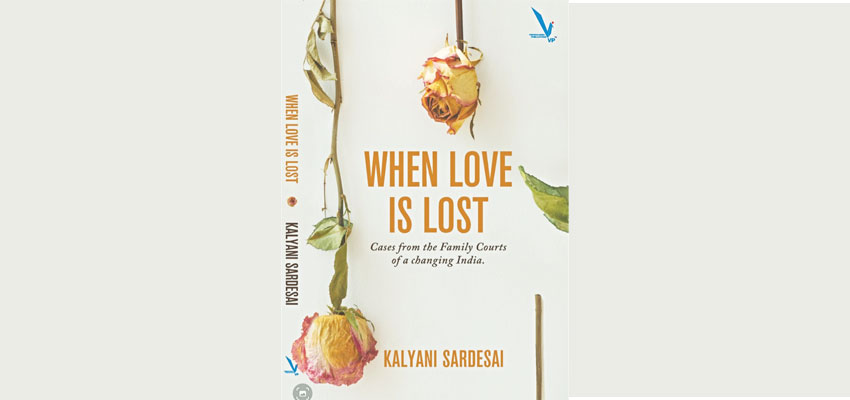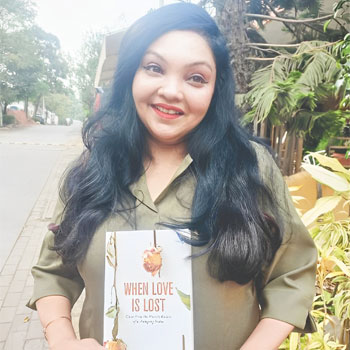Shedding light on modern marriages

"A decade since Corporate Citizen first started the column 'Loved and Married' that explores the dynamics of modern-day marriages, comes a book by the very same writer Kalyani Sardesai, that explores the other side of the equation, namely divorce and the fault lines between relationships that inevitably emerge in a rapidly changing society, one that ironically also prides itself on its low divorce rate."
"Through first-person accounts backed by legal insights, When Love is Lost: Cases from the Family Courts of a changing India sheds light on the emotional costs of divorce. Additionally, noted lawyers, mediators and counsellors share their perspective on the battles worth fighting, and those not. Given the backdrop of International Family Day that falls in May, here’s a look at the book"
Awise man once said: You can tell a lot about a society by the way it treats its women. A wiser one would have said: You can tell even more, if you were to consider how men and women treat each other, in marriages or in live-in relationships, specifically, when equations head south, and the expected happy endings fail to materialise.
Given that the family is the bedrock of society, it is worth delving into the complex nature of marital unions and live-ins. Especially, when they show up for the final reckoning in the Family Court, an institution that bears mute testimony to an unparalleled range of cases, from the heart-rending and touching to the cruel, bizarre, and sometimes inadvertently funny. An institution whose walls could tell stories that outdo what any soap opera writer’s imagination could conjure up.
A recent report by the United Nations shows how the divorce rates in India have become twofold since the advent of the millennium. Additionally, the report also points to the phenomenon of a grey divorce, that is, divorces among people after 10, 15 or 20 years of marriage.
This flies in the face of India’s reputation as the country with the lowest divorce rates globally—only 1.1 percent annually. Indian society has always treated marriage as a sacred, inviolable socio-religious institution.
This is the case across assorted socio-economic and religious lines. And yet, the quantum leap of petitions before the Family Courts. Two contradictor y and contemporary realities…err, how and why is this happening? Thus, When Love is Lost: Cases from the Family Courts of a changing India, is clearly a book whose time has come. A unqiue relationship guide with the law as a cornerstone—recommended for anyone interested in the institution of marriage.
"Given that the family is the bedrock of society, it is worth delving into the complex nature of marital unions and live-ins. Especially when they show up for the final reckoning in the Family Court"
The CC Review

A well-rounded, comprehensive take covering different communities and socioeconomic strata of society, each narration is different, but what runs like a common thread through them all, is the emotional cost of the courtroom battle and subsequent outcome. Some narrations are from the female point of view, some from the male and some neutral—where either or neither of the parties are seen to have faltered.
Information on various legal mechanisms from the Domestic Violence Act to the much feared Section 498A of the Indian Penal Code to divorce by mutual consent, add further value.
Section I has 24 first person accounts of the narrators along with the relevant legal information. The cases across various communities and socio-economic strata.
Meanwhile, Section II of the book has mediators, lawyers, counsellors, sharing inputs—for not every divorce is a bad thing, and some issues indeed deserve a firm stand.
You’d think, having spent years battling divorce cases would have made these professionals immune. Turns out it isn’t that simple.
As Deepa Mavinkurve, senior divorce lawyer says in the book: “To this day, it feels awful each time a judge finalises a divorce. In many cases, the marriage could have been saved with more effort and clarity on both sides”.
Given the rising cases of women misusing the law, Asim Sarode, another noted lawyer points out: “The Protection of Women from Domestic Violence Act, 2005 is a rational and scientific act. It gives women a chance to analyse and audit what happened to them. It isn't anti-men, it's anti-violence”.
As per Sujata Joshi, panellist and mediator at the Bombay High Court: “While the first priority is usually to save a marriage, sometimes it isn’t possible due to irreconcilable differences. The focus is then to get the couple to go their separate ways, peacefully”.
But, as Mavinkurve would add, “My experience says that it is far easier to make your spouse happy. Making them happy takes a lot more work”.
What is worth the trouble is up to the couple concerned.
- Title: When Love is Lost: Cases from the Family Courts of a changing India
- Available on: Amazon
- Price: `250 (Paperback)
- No of Pages: 186
- Publisher: Vishwakarma Publications